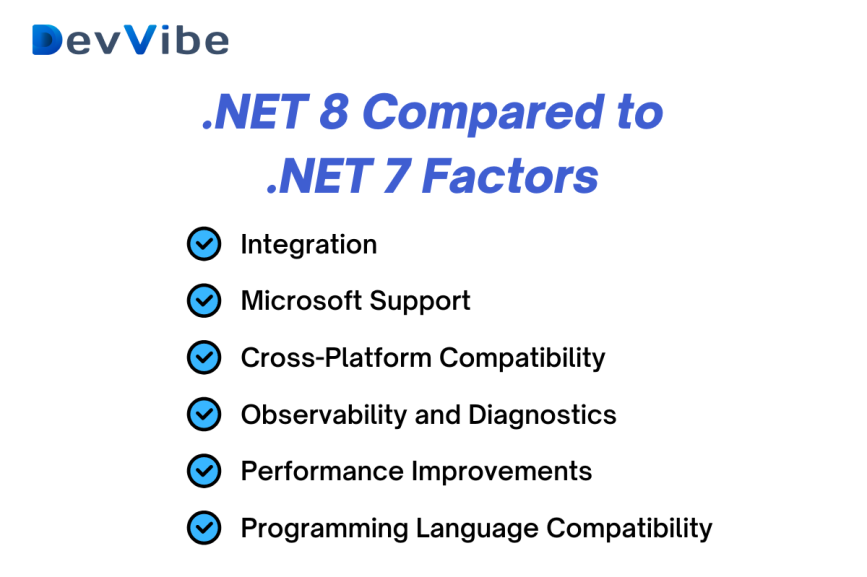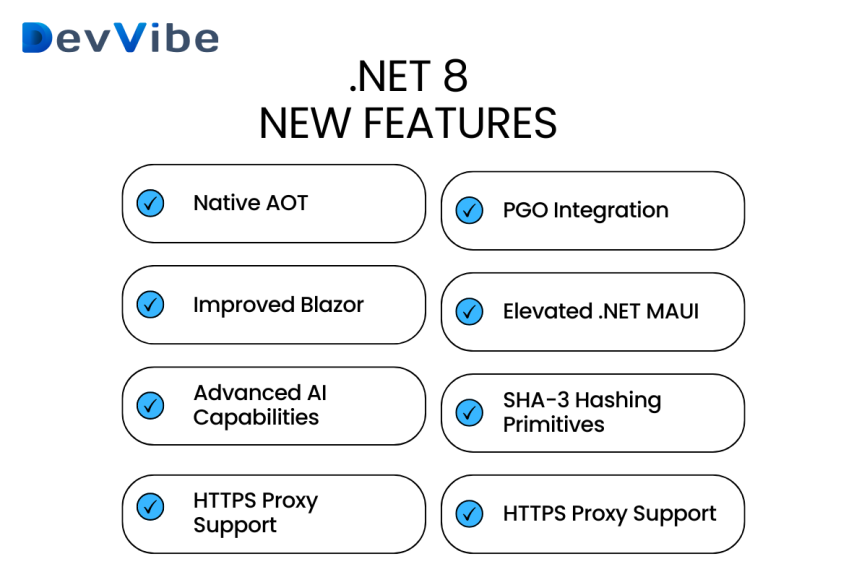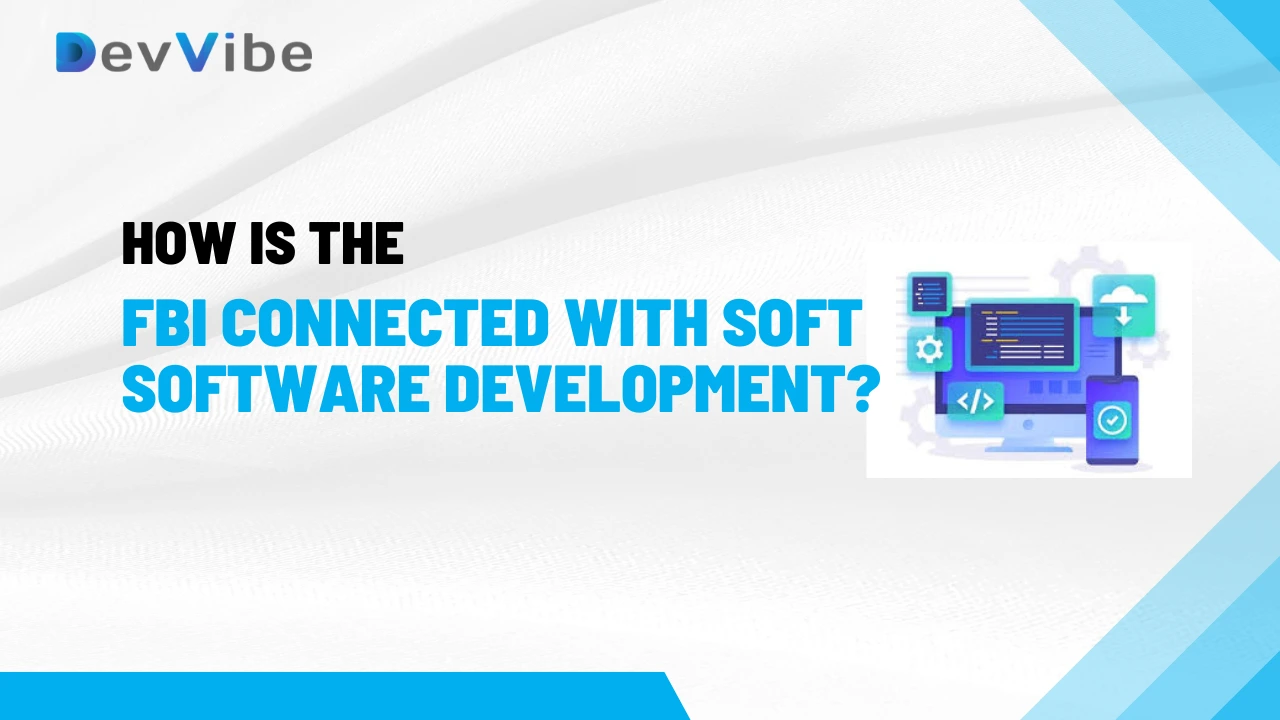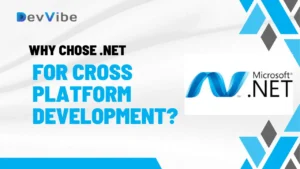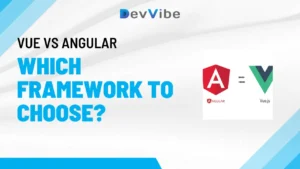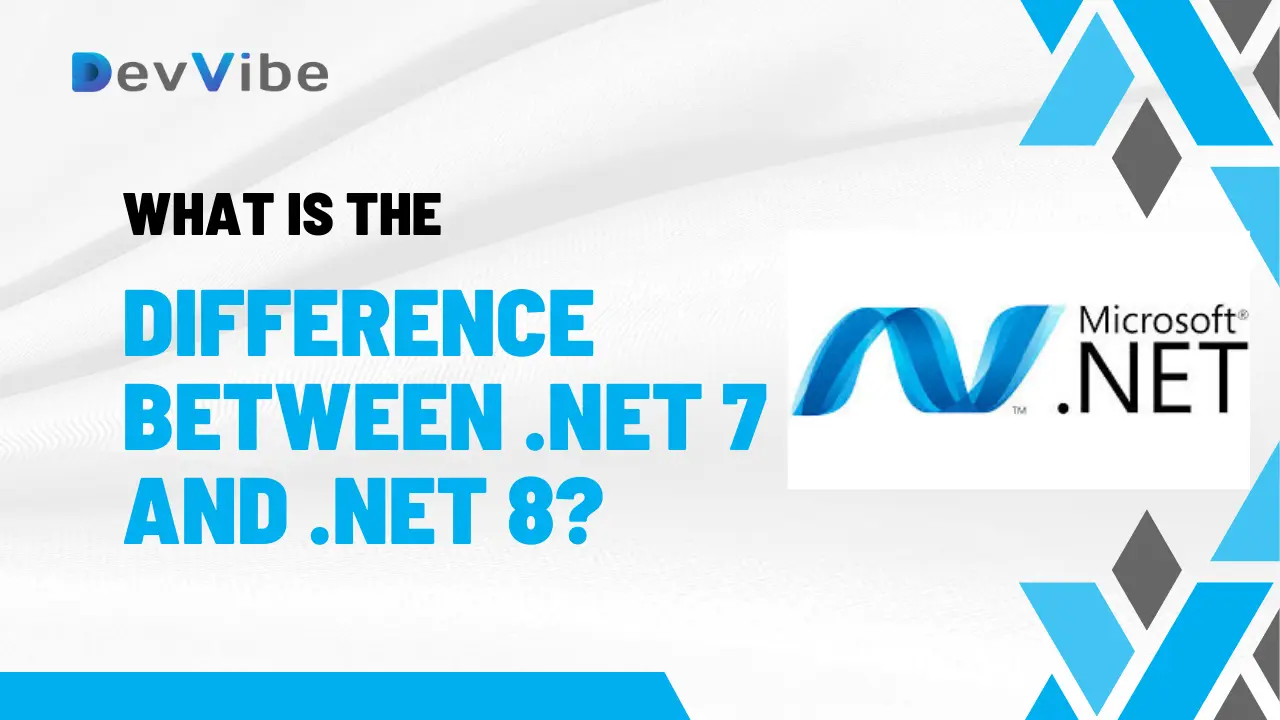
What is the Difference Between .NET 7 and .NET 8?
Microsoft .NET Framework is a popular tool for building software. The newest version, .NET 8, offers key updates over .NET 7. The difference between .NET 7 and .NET 8 provides valuable insights into the performance, integration, diagnostics, and compatibility of both frameworks. The new features in .NET 8 are highlighted and compared to .NET 7 to provide a clearer understanding. By exploring this comparison, you’ll be better equipped to determine which version of the Microsoft .NET framework is the right choice for your needs.
.NET 7 vs .NET 8: Key Differences to Know for 2024
The .NET 8 technology is a significant advancement for Microsoft, packed with features that enhance security, boost performance, simplify integration, and make maintenance more efficient. However, there’s still some uncertainty about whether .NET 8’s new features truly surpass those of .NET 7.
To clear up any confusion, this comparison will help you decide whether to upgrade from .NET 7 to .NET 8.
Let’s explore the differences!
.NET 8 Compared to .NET 7: Listing All Significant Factors
.NET 8 and .NET 7 are both products of Microsoft, designed to help developers create powerful applications. However, they come with distinct differences that make each one unique. By comparing them based on performance, diagnostics, observability, .Net cross platform compatibility, support, programming language compatibility, and integration, you can better understand which one is right for your needs.
Performance Enhancements
Performance is about how fast and efficiently something works. .NET 8 is faster than .NET 7. It uses a specialized tool called a Just-In-Time (JIT) compiler to make code run quicker. The JIT compiler in .NET 8 is better than the one in .NET 7, which means your applications will start up and run faster.
In .NET 8, the garbage collector (which helps manage memory) and the runtime environment (which keeps your app running) are also upgraded. This enables your software to manage more tasks efficiently.
Observability and Diagnostics
When your app is up and running, it’s important to keep an eye on its health. In .NET 7, you might need extra tools to do this, but .NET 8 comes with built-in tools that make it easier to watch your app and fix any issues.
.NET 8 also has a cool feature called “C# hot reload,” which allows you to make changes to your code while debugging without having to restart the app. This makes fixing problems quicker and simpler.
Cross-Platform Compatibility
Cross-platform compatibility allows your app to run across multiple devices and operating systems with .NET 8 providing enhanced support compared to .NET 7. It supports more types of hardware, like AVX-512 and ARM64, which help your app run smoothly on various devices, including Windows, Linux, macOS, and others.
Microsoft Support
Microsoft offers varying support periods for each .NET version under two primary policies: Long Term Support (LTS) and Short Term Support (STS). LTS offers extended benefits, including security updates and feature enhancements, over a longer period of approximately three years. In contrast, STS provides support for a shorter duration, typically around one year.
.NET 8 is backed by LTS support, ensuring Microsoft will provide updates and security patches from November 14, 2023, to November 10, 2026. On the other hand, .NET 7, with its STS support, will only be supported until May 14, 2024. Thus, for better long-term maintenance and security of your application, .NET 8 is the more advantageous choice.
Compare .NET 6, .NET 7 and .NET 8
| Version | Original Release Date | Latest Patch Version | Patch Release Date | Release Type | Support Phase | End of Support |
| .NET 8 | November 14, 2023 | 8.0.0 | November 14, 2023 | LTS | Active | November 10, 2026 |
| .NET 7 | November 8, 2022 | 7.0.14 | November 14, 2023 | STS | Active | May 14, 2024 |
| .NET 6 | November 8, 2021 | 6.0.25 | November 14, 2023 | LTS | Active | November 12, 2024 |
Programming Language Compatibility
.NET uses a programming language called C#. In .NET 8, C# has been upgraded to enable developers to write cleaner and better-structured code. This means the code is easier to understand, fix, and update. .NET 8 also reduces the need for boilerplate code, which is the basic code that developers usually have to write to get things started.
Integration
Integration is about how easily different parts of a software system work together. In .NET 7, developers often need to write extra code to connect different parts of an app. .NET 8 makes this easier with built-in support for many development tools and services. This enables your app to be built and maintained faster, with fewer errors.
New Features of .NET 8 You Must-Know
Now that we know .NET 8 is an improvement over .NET 7, let’s look at some of the coolest new features it offers.
Better Source Generator
The source generator in .NET 8 is like a super helper that creates code automatically. In .NET 8, this generator is better than ever. It can now handle more types of data, and the code it generates is cleaner and more organized. This results in smoother software operation.
Native AOT
Native AOT (Ahead-Of-Time) is a feature in .NET 8 that only uses the code needed for a task instead of running everything at once. This allows your app to start up faster, uses fewer resources, and provides a better experience for users.
Advanced AI Capabilities
Artificial Intelligence (AI) is becoming a big deal, and .NET 8 makes it easier to add AI features to your apps. .NET 8 has improved tools that work with AI services like Azure OpenAI and Microsoft Teams, making your apps more smarter and more efficient.
Improved Blazor
Blazor is a tool in .NET for building web apps. In .NET 8, Blazor is better than ever. It can now handle both the client and server sides of an app, making things faster and more efficient. Plus, new features like static server rendering and streaming make your web apps load faster.
Elevated .NET MAUI
.NET MAUI is a tool that lets you build apps that work on multiple platforms with a single codebase. In .NET 8, .NET MAUI is even better, supporting the latest platforms like Android and iOS, and working with the newest development tools.
SHA-3 Hashing Primitives
Security is always important, and .NET 8 makes your apps more secure with SHA-3 hashing. This is a way to protect data by turning it into a secure code. .NET 8 includes new tools for using SHA-3, making it easier to keep your data safe.
HTTPS Proxy Support
To keep data secure, .NET 8 supports HTTPS proxies, which help protect your information from being intercepted by unauthorized users. This ensures that your app’s communication stays private and secure.
PGO Integration
Performance is a big deal in .NET 8, and the new PGO (Profile-Guided Optimization) feature helps your app run up to 24% faster than before. This means your app can handle more users and tasks without slowing down, giving your users a better experience.
Should You Perform the .NET 7 to .NET 8 Upgrade?
After looking at all the improvements in .NET 8, it’s clear that upgrading from .NET 7 is a good idea. However, if you’re not ready to upgrade just yet, you have until May 2024 to do so. But upgrading sooner will help you take advantage of the better performance, security, and support that .NET 8 offers.
Does Dot Net Application Development Company Prefer .NET 8 over .NET 7?
Yes, most .NET development companies prefer .NET 8 over .NET 7. The primary reason is that .NET 8 offers several improvements and features that align with the latest technology trends, such as advanced AI capabilities, stronger security protocols, and improved performance. With .NET 8’s Long Term Support (LTS) until 2026, companies can rely on continuous updates and security patches, making it a more future-proof choice compared to .NET 7, which only has Short Term Support (STS) until May 2024.
Conclusion
.NET 8 is a powerful and improved tool for building software. It outperforms .NET 7 in every way, from speed to security to support. If you’re currently using .NET 7, planning an upgrade to .NET 8 to take full advantage of all the new features and improvements.
DevVibe is a leading software company with extensive expertise in .NET framework development. Our team excels in creating robust, scalable applications using the latest .NET technologies. We offer comprehensive solutions tailored to meet diverse client needs, ensuring optimal performance and security. With a strong focus on innovation, Devvibe is committed to delivering top-quality software solutions that drive business success



